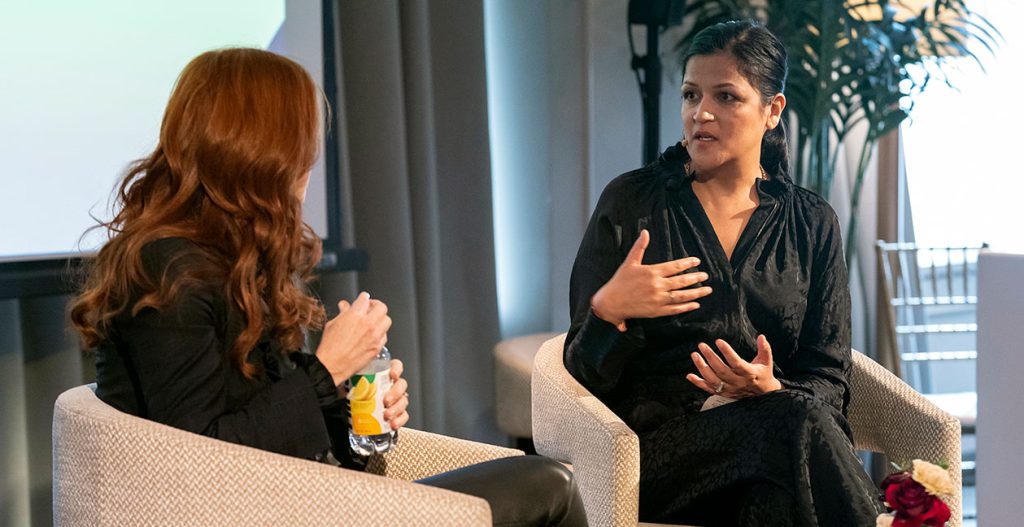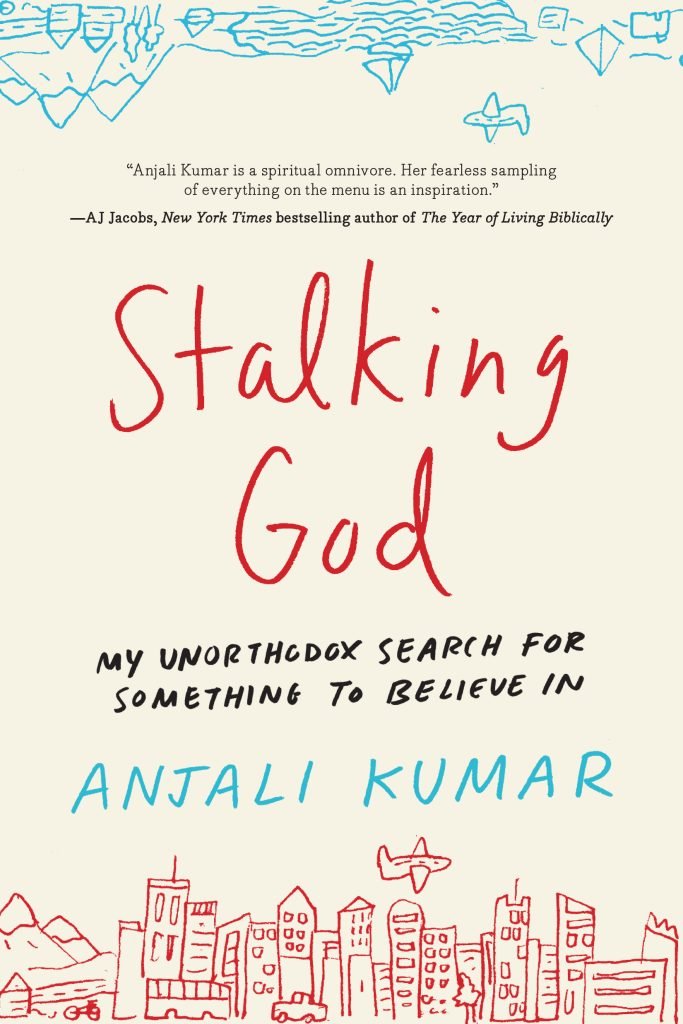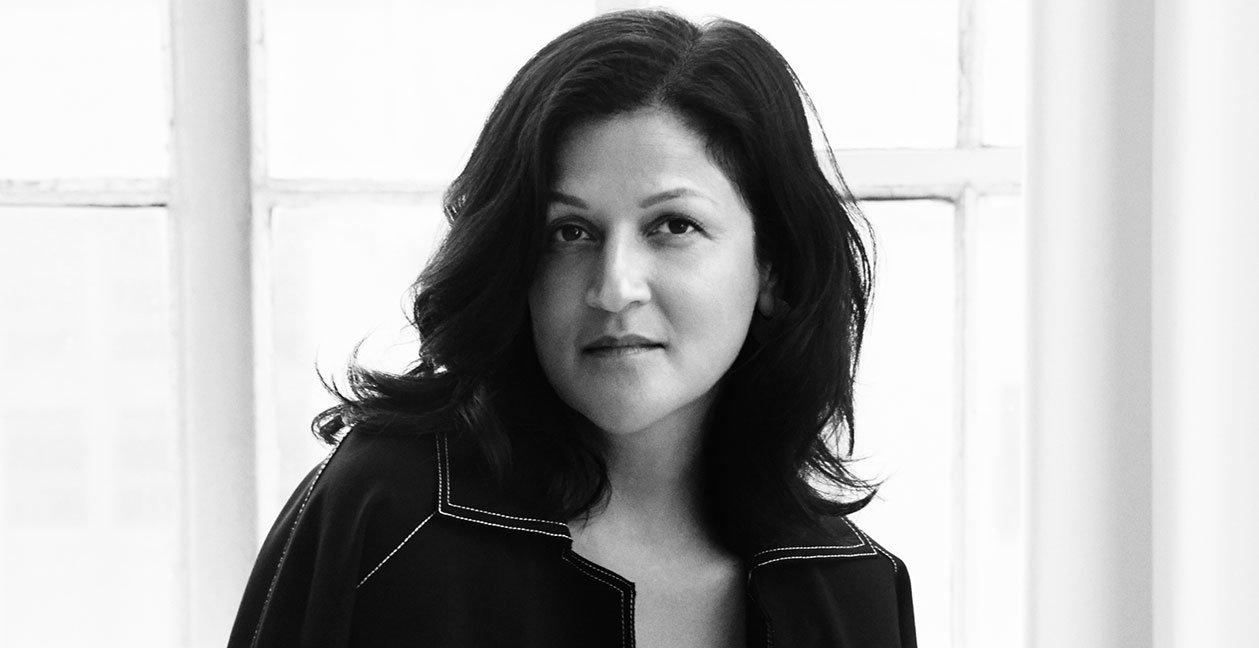By all appearances, attorney Anjali Kumar had everything figured out. Her stellar career includes senior roles and general counsel appointments at Cheddar, Warby Parker, Acumen and Google. Still, when her daughter Zia was born 10 years ago, Kumar found herself spiritually adrift. In characteristic fashion, Kumar, who is also an adjunct professor at Columbia Business School and Fordham University, pursued enlightenment with zeal and humor. The resulting book, Stalking God: My Unorthodox Search for Something to Believe In (Hachette 2018), has been translated into over 20 languages and is now being developed as a television series.
Kumar spoke with Worth about what she learned at a Wiccan potluck, how the coronavirus pandemic furthers her belief that we are all connected and how she mines productivity from discomfort.
Q: You identify yourself as an “ideas acupuncturist.” What do you mean by that?
A: Over 10 years ago, as a lawyer for Google, I went to TED for the first time. Our titles were somewhat meaningless. People were interested in Google, but the moment you said you were a lawyer, they were like “eh…” and not wanting to talk. We needed to make identification badges, and my friend said, “You’re not really a ‘lawyer.’ You’re more like an idea acupuncturist. You go into a company and help them unblock energy flow.”

So it started as a joke, but became more descriptive of how I practice law and advise companies. When companies are stuck, sometimes it’s helping figure out a deal structure, sometimes the company needs to pivot, and it’s figuring out what that looks like. Sometimes it’s legal work and sometimes it’s just thinking through things.
In your TED Talk you describe being a minority of a minority, as having Indian heritage in America, and as a Jain, and then attending Catholic school in a Chicago suburb. How did seeing yourself as “the other” inform your spiritual quest?
I knew there were commonalities in what I was experiencing, but I was very aware that people saw me as different and I was raised hyper aware of those differences.
I don’t know that I would have the perspective I do without having had the experience of being a minority within a minority, of being in Catholic school and knowing I couldn’t take communion, sitting in the pews with my sister while everyone else was in line. The Church wouldn’t allow us to stand in line and get a blessing. Things like that were always pointed out. I grew up in a predominantly white suburb and went to Catholic school and then public school without many people who looked like me.

Part of the search was feeling that nothing quite fit, and asking, what do I think about the big questions in life, what do I tell my daughter, and how do I get answers for her? That’s how it started.
And what did you learn?
We’re all ultimately looking for the same things. This coronavirus pandemic really heightens that too—we live in such a hyper connected world. We all want health, happiness and love and these times highlight that so much more.

You’ve said you were inspired to write Stalking God for your daughter Zia, who was a baby when you began the book and is now 10 years old. How is your work informing how you raise her?
I started thinking about these questions a few weeks after she was born, in a conversation with my dad. He asked me if I was taking my daughter to temple, to show her our beliefs. I didn’t know what I believed. I was really into the cultural aspects of Jainism but not necessarily the religious. When Zia was a year old, I started to explore spiritual practices. When she was about 5, she was sitting in the car with us and asked out of the blue, “Who made God?”
She started asking questions like that. My husband is Hindu and very scientific, a cardiologist who doesn’t really think about these things.
I’ve come to peace with not knowing the answers, and raising her to be kind, empathetic, curious and open hearted.
How has Zia reacted to the book?
She is really amused by the idea of it. She hasn’t read it, that I know of. She is a voracious reader, so she may have snuck chapters here or there. I think she loves that it exists and that there’s a story inspired by her. I think it’s inspired her to write. I never thought of myself as a writer growing up, but it’s shown her that it’s possible and that our stories matter. I never saw stories by people who look like me at our school library. Her bookshelves are full of people who look like her. For Zia to walk into her school library and have a book that literally is about her is game changing and a really powerful take away.

Do you still identify as being “spiritually homeless” and/or as religiously “none”?
I do. I’m more at peace with it. If pushed, I would identify as Jain, but for me it’s so cultural, and that’s why I never thought about it growing up. Religion is so intertwined with cultural experience in the East, and there’s no real distinction. All of your holidays are religious. I’m sort of Jain-ish…
Your search led to encounters with a wide variety of characters, from witches to shamans to the manager of the band The Roots, and a now-discredited Brazilian faith healer. How did you find them and who taught you the most?
It was all very organic. It wasn’t like, let me go to the weirdest person I can find. The Roots manager I met at a tech conference. The medium is through a friend of mine who is a marketing executive and part-time shaman. I met him at a charity event with his wife. It was all kind of random. I did things I was genuinely interested in, and it ended up being comical because I was the central character and I take a lighter approach.
Did you get any criticism for taking that approach to such a serious subject?
One of the reasons I hesitated to write it was because I didn’t want to be disrespectful of anyone’s faith. I was really mindful that the humor only come from my experience, not from poking fun at something. And I know that just because a spiritual practice doesn’t resonate for me doesn’t mean it doesn’t resonate for anybody else.
There were some unhappy Amazon reviews. One of the first reviewers was really mad at my book. She was very into Jesus, clear in her faith, and asked, “Why did you not find [Jesus] to be the answer?” I wasn’t proselytizing, so I was OK with that criticism.
What was the most surprising experience in your journey?
There were people I met I was really humbled by. My publisher and editor encouraged me to explore Wicca. I had all these stereotypes about witches, probably naïve and informed by Disney. When I stated researching, I realized these were interesting, strong, brave women who came to Wicca when other religions—the women I interviewed were Catholic and Muslim—failed them. Meeting them and hearing their stories was really moving.
How did you meet the Wiccans?
Through a Facebook posting. I saw that they were holding a Thanksgiving potluck dinner. I went straight after my daughter’s school’s homecoming game, and brought cupcakes that the opposing team gave out. [New York City’s] Chapin cupcakes for Wiccan Thanksgiving.
What in your search has helped you understand the conflicts that are so pronounced in our society?
I was probably always wired pretty open-hearted and open-minded and was looking for those commonalities. The search reminded me of the commonality of our humanity. And I hope people see that. We’re getting more and more data that we really need to focus on the stuff that binds us together, and we’re not doing it. Even the coronavirus, how much more evidence do we need that we’re all deeply connected?
Why can’t we do good with that kind of contagion. How do we make it helpful?
Stalking God is going to be made into a television series. Can you tell me about that?
We’re still in development to make it into a scripted, fictional comedy version. My daughter wanted her character to have the same name, but we’re changing it so she doesn’t sue us one day.
Do you have ideas for which actress should play you?
I have a secret wish list.
Before writing Stalking God, you made a career advising some of the country’s hottest startup brands. What were your greatest challenges and triumphs in that phase of your career?
Before the book, I had a long career, 20-plus years of working in nonprofits, and Google and other startups. The thread is staying very curious and being willing to be in uncomfortable situations. That played out in the book process too. That’s the biggest triumph. So much of being a lawyer is doubling down on a specific issue of the law and becoming a deep expert. I’ve made my career in a nonconventional way, being the person you throw into anything. When you need a deep expert, I find you that person and move on to the next thing.
The board member/advisory mix I’m doing now has grown from that. I’m able to take all of those learnings and connect dots across things that people wouldn’t necessarily see, and maybe be a bit of a moral compass, especially on a board.
How did writing Stalking God change your perspective on your career, and what is your professional life like now?
It reiterated and clarified the idea that I want to stay open to new experiences and stay curious. I really like that beginner’s mindset and putting myself deeply outside of my comfort zone. That’s where my sweet spot is. I worked that muscle hard at Google because my job was basically changing every six months since we were growing so quickly.
It clarified for me that I enjoyed that kind of challenge, that I am good at it and go into every experience with an open mind and an open heart. It also clarified that I want to work with really good people and that’s what’s of paramount importance to me. I have a strong no assholes rule, both in my personal and professional lives and experience.
You’ve spoken about misogyny in tech culture. What are the challenges to improving it, and where do you see opportunities?
Since the Harvey Weinstein trial, people are on notice about their behavior. It’s had a chilling effect and that’s a good thing, but upsettingly, it’s not going to change a lot. It’s not going to change things overnight.
I think a “it’s not as bad as Weinstein” standard has emerged, and I worry the lesser things are getting overlooked. Sexual harassment and rape are not the only things that are bad in an office. There’s a lot that falls well short of those behaviors that still affects people’s careers. There are a thousand microaggressions that can damage careers.
I also see a trend of calling out women executives more than men. It’s upsetting when you know that there are male CEOs behaving just as poorly and who are just as inexperienced in management [as someone like Outdoor Voices’ former CEO Tyler Haney] and none of those stories are coming out. [WeWork’s] Adam Neumann got away with a lot of stuff before anyone said anything.
Does that extend to our political climate?
It’s the same thing. The stuff that’s acceptable in male politicians would never be acceptable in a woman. It shouldn’t be acceptable in anybody. If a woman talks over a man in a debate, she “interrupted” and was “rude and aggressive.” If a man does it, it’s not even acknowledged, or it’s celebrated.
Has Zia inspired anything else you’re working on?
When I decide which company boards I’m on and who I’m advising, I feel an accountability not just to myself but to her. I want her to feel proud. On the creative side, she continues to inspire my work and my writing. She’s an entertaining character, and there’s a lot of material to mine there.






